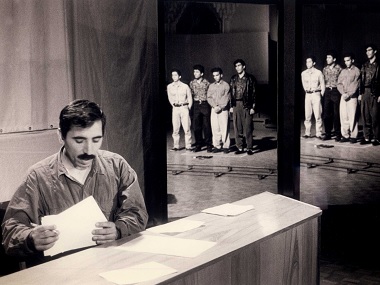In 1895, the Lumière brothers, in Paris, held the first paid public screening of 10 short films, including the now-famous Workers Leaving the Lumière Factory. A hundred years later, Iranian filmmaker Mohsen Makhmalbaf dreamed up a novel way to celebrate the centenary of this new medium. Salaam Cinema (1995) is about a director holding auditions for a film he wants to make, and the opening stretch hints at his intentions. At first, the camera is the audience, looking through the windshield of a car, sweeping (invisibly) through roads, past rows of aspirants. Then, the gaze changes. We now see a man seated on top of this car, holding a camera. Makhmalbaf is laying bare the mechanics, the artifice of the medium. He’s looking at both the people who will be in the movie and the people who will make it – including himself. The director holding auditions – that’s Makhmalbaf himself. We are at the location. An assistant yells “Stay in line,” as he passes a woman in a chador, a little girl wearing sunglasses, a man in a Nike T-shirt – but these individualities soon vanish as a sea of people fills the frame. You may be reminded of the surging throngs outside the mansions of Amitabh Bachchan or Shah Rukh Khan. Speaking into a loudspeaker, Makhmalbaf says, “We are making a film about those who’d like to become film actors. We’ve already started shooting. Some of you will be chosen to act. You came here because of the ad in the press. But there are too many of you. So please stay in order so that my assistants can hand out a thousand forms. We will select about a hundred of you and some will get leading roles in the film. You are both the subject and the actors of this film. So I’d just like to welcome you to your own film.”
; Is this a documentary, a fly-on-the-wall depiction of a “real” process? Or is it fiction, with careful manipulations and people being fit into a director’s pre-planned narrative? Whatever it is, it’s certainly chaos. Forms are flung in the air. People grab at them. Iran may make more “civilised” movies than India, but when it comes to the craze for entertainment, there’s clearly not much difference between the two countries. Take the first man who walks into the audition room. He wears black glasses. He is blind. He says, “I love cinema. I’d do anything for it.” This sentiment echoes throughout the film. Later, when one among a group of girls is asked to cry, she finds she is unable to. Makhmalbaf says, “If I told you that you won’t be hired if you’re not able to cry, does it make you cry?” The girl replies, “Yes, because I love cinema.” But cinema isn’t just about passion. It also means something, different things to different people. For instance: Is it possible to be both an artist and a humane person? This question comes up during one of the auditions and it applies to Makhmalbaf, too. He is, after all, asking these auditioners to cry on demand, to pretend as if a grenade was thrown on them. He does, after all, have the power to make or unmake their lives – and if he cares about his film, he cannot afford to cast someone just because he feels sorry for their plight. Take the woman whose boyfriend left Iran when their parents disapproved of their match. She asks to be cast because Makhmalbaf’s film will go to Cannes and she can get a visa to attend the screening, and thus flee Iran and join her boyfriend. (What a beautiful bit of irony. This is the fate of many Iranian filmmakers themselves.) But is that enough?
There’s the man who thinks he looks like Paul Newman. There’s the man who says he keeps getting cast as the villain because he is not conventionally handsome. He says, “Because of my face, I get given that sort of part.” Makhmalbaf asks if he thinks he is a bad person. The man says no. Then why does he always get to play the bad guy? He says, “It’s the director’s idea. I’m not the one who decides.” It’s another aspect of cinema: looks, and how they shape careers. There are many films that talk about cinema. Robert Altman’s The Player looks at it like a disease that affects everyone associated with it. George Cukor’s A Star is Born looks at fame, and what the lack of it can result in. Salaam Cinema looks at cinema through people least likely to find themselves on the big screen, but have, in one way or another, moulded themselves through what they have seen on it – like we all have. The film is about Iran. Where else would you find an auditioner who has been a political prisoner? The film is about patriarchy. Note Makhmalbaf’s words to a woman who’s unable to cry: “Half of a woman’s success is knowing how to arouse pity when she has to. Otherwise it’s impossible to get on in life.” (He may be provoking her, of course. But it still sounds awful.) “The cinema belongs to those who are able to sell their feelings when they’re asked to,” he says. Contrast this with a woman who reveals why she wants to be an actress. “I chose art for its humanity. I’ve noticed that an artist has more respect for a mosquito than other people, like engineers who live with formulas rather than with feelings.” It sounds beautiful. Is it true, though? But then, do we care? It makes us feel good for a bit. Maybe it’s just a beautiful lie. But that’s cinema, too. Baradwaj Rangan is Editor, Film Companion (South).


)
)
)
)
)
)
)
)
)



